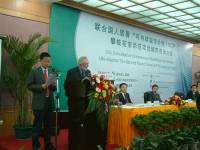Background and Objectives
The project built on and up-scaled earlier support to the cities of Shenyang and Wuhan by helping them to institutionalize the lessons learned It also undertook a comprehensive adaptive study on the SCP-EPM/China approach and process which customised a sustainable city environmental planning and management approach for China and built an institutional structure to disseminate the lessons learned and application approaches to additional cities and communities under the ACCA21 "National Sustainable Communities Network" (NSCN).
As a result, SCP-Asia support has enriched national and city implementation of Local Agenda 21 and up-scaled the lessons learned to other cities within the NSCN. With ACCA21 and Beijing University/DISC's successful implementation of this project, the Chinese adaptation of the SCP-EPM approach has been localized and adapted into a model which is providing policy, technical expertise and good practice support for future national implementation of Local Agenda 21 in China's NSCN, including integration of the lessons learned into Beijing University teaching and research curricula.
Activities
The main activities include:
* City partnering and mobilization of the project participants
* Localization of the SCP-EPM/China Guidebook and development of training curricula & tools
* SCP-EPM/China implementation in the new cites
* Guidebook and training material revision, SCP up-scaling & promotion nationally through NSCN.
Results (2008)
 Panzhihua City Consultation,
Panzhihua City Consultation,Second Round China SCP
Promotional Project (SCPII)
* City selection strategy, candidates agreed and documented with signed partner agreements, Project group, Project Phase 1 working plan agreed and Phase 1 implemented;
* Adapted guidebook and training toolkit, evaluation seminar proceedings prepared and distributed, training program for NSCs documented and reported, progress report disseminated;
* Public consultations and inter-departmental working arrangements documented, EPM training documented, Environment Profiles, City Consultation proceedings, Strategy and Action Plan for identified environmental issues by city, and demo-projects documented, EMIS operational, Implementation Report prepared and disseminated amongst NSCN;
* Revised and finalized SCP-EPM/China guidebook and training materials, China SCP Implementation and Replication Strategy Report, National seminar proceedings, high level official reporting meeting minutes, and Completion Report prepared and disseminated to NSCN.
Development Partners / Partners
Development Partners: UNEP
Partners: The Administrative Center for China's Agenda 21 (ACCA21), Ministry of Science & Technology (MoST), Ministry of Construction, Panzhihua, Hailin and Guiyang Municipal Governments, Beijing University, Development of Institutions for a Sustainable China (DISC)
- Low Carbon Economy and Sustainable Urban Development Pilot Project – Jiangyin Non-Development Zone Practice
- Earthquake-resistant Reconstruction of Hongshe Primary School
- Getting Children Back to School (Completed)
- Promoting Sustainable Urbanisation
- Semi-Aerobic Landfill System (Completed)
- Urban Indicators Project (Completed)






































